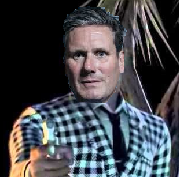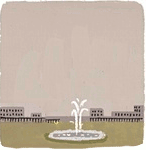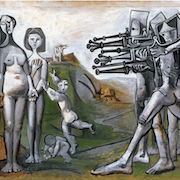|
Surprise Giraffe posted:Someone linked to or posted the actual quote from Corbyn that got turned into CLAUSE 4 but I can't find it now. Has anyone else got it? (the quote not the clause) “I think we should talk about what the objectives of the party are, whether that’s restoring the Clause Four as it was originally written or it’s a different one, but I think we shouldn’t shy away from public participation, public investment in industry and public control of the railways. “I’m interested in the idea that we have a more inclusive, clearer set of objectives. I would want us to have a set of objectives which does include public ownership of some necessary things such as rail.” http://www.independent.co.uk/news/u...y-10446982.html
|
|
|
|

|
| # ? Jun 9, 2024 19:38 |
|
Vitamin P posted:Yeah but when you actually read it it's blandly inoffensive. I dunno I tried reading it and it was a bit poo poo, very much a goss rag. I suppose it's not as offensive as the actual mail or goss rags but I mean, that's not saying much. kingturnip posted:The Metro is probably even worse than the Mail because the hatefulness is done through subtext, careful word-choices and general editorial decisions (which story goes where). This may explain my aversion, I really didn't like it but I can't put my finger on why.
|
|
|
|
kingturnip posted:The Metro is probably even worse than the Mail because the hatefulness is done through subtext, careful word-choices and general editorial decisions (which story goes where). You look at the average Mail article and there are dogwhistles and soft prop all over. The Metro doesn't have that, if only because the coverage is so simplistic. They haven't even had a go at the tube strikes while the Standard got stuck in with 'our Boris our modern city' bollocks.
|
|
|
|
Because the Metro is mostly slightly rewritten AP feed.
|
|
|
|
|
So are most papers, these days, to be fair.
|
|
|
|
Jose posted:the death of the papers can't come soon enough I know that a lot of the media is terrible, but this sentiment come up quite often in lefty circles (most notably in the Scottish Indy ref), and I think it's really misguided. The main issues is the most obvious one: what replaces papers? Not to defend them as Guardians (pun intended) of truth and investigative reporting, but the notion that the death of papers will result in a better journalistic landscape seems fundamentally flawed. The oft-cited alternative - "social media" - is as distressingly vague as it is utterly inadequate. The belief that somehow opinionated blogs or occasional snap shots on twitter or whatever can, will and should become the primary source of news seems to me to reflect the problem, rather than be the solution. It relies on a strange and unfounded faith that the death of papers somehow increases rather than diminishes the plurality of media sources, when it will almost certainly increase reliance on a smaller set of news wires, along with a similar belief that people sharing things on facebook or twitter or whatever somehow produces a radical cultural shift towards expansive knowledge, rather than simply encouraging a repetition which reinforces already existing prejudices.
|
|
|
|
The papers are propaganda pamphlets published on behalf of the super-rich.
|
|
|
|
Facebook and Twitter are potentially even worse if they start playing with their content promotion algorithms, though.
|
|
|
|
Niric posted:I know that a lot of the media is terrible, but this sentiment come up quite often in lefty circles (most notably in the Scottish Indy ref), and I think it's really misguided. The main issues is the most obvious one: what replaces papers? Not to defend them as Guardians (pun intended) of truth and investigative reporting, but the notion that the death of papers will result in a better journalistic landscape seems fundamentally flawed. The oft-cited alternative - "social media" - is as distressingly vague as it is utterly inadequate. The belief that somehow opinionated blogs or occasional snap shots on twitter or whatever can, will and should become the primary source of news seems to me to reflect the problem, rather than be the solution. It relies on a strange and unfounded faith that the death of papers somehow increases rather than diminishes the plurality of media sources, when it will almost certainly increase reliance on a smaller set of news wires, along with a similar belief that people sharing things on facebook or twitter or whatever somehow produces a radical cultural shift towards expansive knowledge, rather than simply encouraging a repetition which reinforces already existing prejudices. I think, at least, people sharing poo poo on facebook opens up the potential for discussion and citation. Granted this would require people to actually challenge the poo poo that gets shared on facebook, but nevertheless it's far more possible to challenge a lie as it appears with direct evidence, than to discuss topics like "last week in the paper I read about muslim hordes invading the UK".
|
|
|
|
up to a few years ago, it seemed that newspapers would die a slow death and social media would eventually face a crisis when it runs out of expensive old media to share however, of late, it seems that paywall experiments are starting to work - an increasing share of subscription revenue, rather than advertising. Paywalls can be adaptive - articles that go on the social media rounds can have their walls temporarily lowered to encourage readers to buy a sub, that sort of thing. that's still a lower overall circulation, of course
|
|
|
|
Private Eye is the only decent piece of journalism left in this country. Also can someone correct me if I'm wrong but hasn't the Grauniad not made any money in a long while and is basically only kept going because its owner think it should exist and just sink money into it.
|
|
|
|
StoneOfShame posted:Private Eye is the only decent piece of journalism left in this country. Also can someone correct me if I'm wrong but hasn't the Grauniad not made any money in a long while and is basically only kept going because its owner think it should exist and just sink money into it. The Graun is funded by the Scott Trust, so yes but that owner died in the 40s. The Trust has an investment fund that's likely in excess of £850m so even though its business model haemorrhages money, you probably won't see the Guardian going anywhere soon.
|
|
|
|
Party Boat posted:The Graun is funded by the Scott Trust, so yes but that owner died in the 40s. I assume as the money slowly depletes the pace of its websites slow transformation into buzzfeed will increase.
|
|
|
|
StoneOfShame posted:I assume as the money slowly depletes the pace of its websites slow transformation into buzzfeed will increase.
|
|
|
|
i read the metro most days to see if any qts have noticed me on the train and written about me in Rush Hour Crush. Nothing yet but I'm staying optimistic. 
|
|
|
|
Oberleutnant posted:i read the metro most days to see if any qts have noticed me on the train and written about me in Rush Hour Crush. How would you ever even known they are all like "Hey there man on a bus in Reading. You were wearing a shirt, I am the person with eyes. Call me."
|
|
|
|
Niric posted:I know that a lot of the media is terrible, but this sentiment come up quite often in lefty circles (most notably in the Scottish Indy ref), and I think it's really misguided. The main issues is the most obvious one: what replaces papers? Not to defend them as Guardians (pun intended) of truth and investigative reporting, but the notion that the death of papers will result in a better journalistic landscape seems fundamentally flawed. The oft-cited alternative - "social media" - is as distressingly vague as it is utterly inadequate. The belief that somehow opinionated blogs or occasional snap shots on twitter or whatever can, will and should become the primary source of news seems to me to reflect the problem, rather than be the solution. It relies on a strange and unfounded faith that the death of papers somehow increases rather than diminishes the plurality of media sources, when it will almost certainly increase reliance on a smaller set of news wires, along with a similar belief that people sharing things on facebook or twitter or whatever somehow produces a radical cultural shift towards expansive knowledge, rather than simply encouraging a repetition which reinforces already existing prejudices. A while ago I had to put together details on the media and its issues to speak to a group of socialists about it and had it typed up so it was easily transferable to an effort post. A lot of the details are based on Flat Earth News, which everyone should real but will mean the analysis is a few years out of date. One thing we can do though is look at how we got here; Why journalists are churning out stories on celebrities, hacking phones and blagging for easy stories and pumping our press releases and wire reports rather than doing original research into what matters. For one, the network of journalists that are the essential to reporting news just don't exist any more in the same way they used to and in large part this is down to Murdoch. Before 1986 the printers unions and the National Union of Journalists did a fair enough job of holding off commercial interests, standing up for their principles and ensuring high quality, although they relied on the printers union for support. An example of them fending off commercial interests came a couple of years before 1986 when the miner's strike was going on. The Sun tried to run a front page photo of Arthur Scargill waving to miners in a way that had been captured in a way looked kind of like a nazi salute with the headline 'Mine Fuhrer' in a fairly obvious attempt to slur him. Well I don't know if anyone's seen the front page of The Sun from the day they went with the story, but there's no photo and no headline. The printers just weren't willing to put it together. Instead there was a large print statement saying that the Sun production chapels had refused to print the headline or picture. It wasn't just basic morality and a sense of decency which lead the printers to do this, but also a recognition that if Thatcher succeeded in breaking the miner strike then they could be next and that's basically what happened. Murdoch built a new print plant in Wapping and tried to reach agreements with staff which would limit their ability to organise as a union, like the end of the closed shop and a no strike clause. After months of negotiation the employees eventually went on strike and with military precision Murdoch, after asking Thatcher to confirm she would support him, had all 6,000 of them fired, convinced enough journalists to work as scabs to carry on publishing and got new workers in from EETPU to run their new presses (EETPU being this catchily named electricians union that got expelled from the TUC a couple of years later). The strike managed to last over a year under a lot of criticism from the government and newspapers as well as police suppression, but in the end it was broken, thousands of people were out of work, the union's strength was destroyed and Murdoch was making more profit. After that, the rest of the Fleet Street papers followed suit. From there there was little resistance as journalists were fired and not replaced on a massive scale. Before the Wapping change Murdoch's titles made £35 million in profit. Three years later and this had quadrupled but during the same period their total staffing had dropped from 8,731 to 949. Again, the other papers were quick to follow him. It's this breaking of the unions that has really accelerated commercialisation of news, because they were the big barrier against the focus purely on profit. Before then you couldn't lay off a load of staff in downsizing because you'd have a horde of journalists and printers mobilising against it. After Wapping, they couldn't. It's not news to me and I hope it's not new to you that in every privatised industry, the drive for profit will turn the focus away from social benefits and towards increasing earnings. The energy sector is pursuing short-term profit while causing massive long-term term problems for the entire world by continuing with their use of fossil fuels, with trains the rail in this country has gone to rot since it was privatised and with housing there are millions of people who can't afford a home because the housing industry's focus is obviously on making the most money rather than housing the most people. With journalism, I'd say that ideally what they're meant to be supplying is a truthful representation of the important events. If we look at how the system has changed, especially in comparison to how things were pre-Wapping, then we can see a lot of ways in which the current set-up has really got in the way of that goal. This isn't just just because there are a few bad eggs who'll break laws if it gets them a good scoop and some money, it's a systematic failure of the media's ability to accurately report the truth. The Workers Firstly there are simply far far less journalists out there. There aren't and have never been tens of thousands of Guardian, Daily Mail, Mirror, Independents and Times journalists out there digging up stories all across the UK for the big top tier nationals. Instead they and all the major TV and radio stations relied upon a network of smaller local papers and specialists scattered about the country that formed the essential infrastructure of news gathering. These organisations just no longer exist in the same way they did a few decades ago. A third of the local newspapers that used to exist twenty years ago have simply disappeared, while the number of journalists at the local newspapers still up and running has gone down with more than half of the provincial NUJ members lost their jobs in the decade and a half after Wapping. The local freelance agencies that didn't publish their own paper but simply rooted out stories and sold them on were the other place that journalists could go to to get news from across the country, but these are even worse off as the big papers cut their budgets for buying stories and froze the prices of those they did get meant the agencies had to shed staff and close. There were five agencies in Leeds, now there is one. Around Merseyside three of the four agencies closed and the one that did remain shrunk to around half the number of staff. The same thing happened in Stoke, Manchester, Derby and pretty much every city across the country save London while in rural areas, the smaller towns and villages, the one-man-bands that had covered them simply went bust. The story is the same wherever you look, like the specialist court reporting agencies that used to dig out several national news stories every day, including some fairly large scandals like when they caught the Chancellor Nigel Lawson's wife being snuck into her drink driving hearing which had been scheduled for before the courts would normally be open. Practically every supply line of national news and information to the major new organisations, not just the papers but TV and radio too, has collapsed in a bid to save money and cut costs. Meanwhile, at the big well-known news organisations things aren't much better. Although they haven't suffered cuts as massive as the ones faced by smaller newspapers because, for instance that 8000+ employees being reduced to less than 1000 I gave for Murdoch's papers after Wapping was mostly normal working people like the printers rather than journalists who are involved in finding and reporting on news, the numbers of journalists at the major Fleet Street organisations has still dropped. The big problem they face though is completely different; it's the workload. Although there are almost as many journalists at major papers as there used to be, they space they're expected to fill in a paper has trebled and that's before you take into account more recent innovations like free sheets, websites, blogs, podcasts and all those extra things that are considered essential nowadays. Trying to do three times as much work in the same space of time with less staff has two effects. One is that they spend less time checking the accuracy of their stories to make sure they're true and the other is that they are having to rely less and less on their their own investigative journalism and more and more on other sources of information. Now the normal pipelines of information, the local newspapers and independent journalists, have been cut and replaced by new kinds of service providers that aren't up to task which the remaining journalists have to rely on more and more. The Sources The big source journalists use is now the wire agencies like the Press Association. These are the people that the Queen or an MP or the police service or government departments speak to if they want to make a national or an international statement who also have their own reporters around digging up information. Every news organisation of any sizes subscribes to them. All the national papers, all the major regions, all the freesheets like the Metro, all of the BBC national and regional outlets, all the commercial news and radio stations, they all subscribe to it and they all rely on it. A study into the major Fleet Street publications, the respected ones like The Times, The Guardian, The Independent and The Daily Telegraph, as well as the Daily Mail because it's a monstrously well-selling mid-market title found that about a third of their articles were direct rewrites of wire material where at best they'd just slightly changed the layout. Another fifth were largely reproduced from the Wire and another fifth on top of that contained elements of wire stories but had a fair amount of original material added on top. That's about 70% of major UK stories either wholly or partly rewritten from wire copy. It's completely replaced the national network of local journalists as the major pipeline of stories into the big papers. A typical journalistic rule is that you need two sources for every story. For a lot of media organisations, including the Beeb, a Press Association story pulled off of the wire doesn't need a second story to go on the waves, it's considered good to go as is. The problem is that wire organisations just aren't up to the job, either in terms of coverage or accuracy. To compensate for the thousands of local reporters that have disappeared from regional newspapers throughout the country, the PA have assigned an extra fifty reporters to cover regional and local news across the Irish republic, Northern Ireland, Scotland, Wales and all the major cities outside of London. This means, for instance, that Greater Manchester, Lancashire and Cumbria are covered by five reporters, including trainees. Merseyside, Cheshire and North Wales have two. Cardiff has four for all of South Wales and the Wales Assembly. No matter how hard these journalists work, these dozens of journalists can only dig up the tiniest fraction of news that the several thousand journalists they're replacing used to. It's not anywhere near enough. On weekends and evenings they have one reporter to cover the entire North West. That's over seven million people being covered by one person. That's the network that the major newspapers are using in part or whole for 70% of the stories they publish. They don't have the resources to comprehensively check for accuracy which means we get stories that are simply wrong and they don't have the manpower to go and actually find out all the important stories that are happening out there. Those same problems being faced by the newspapers who are now forced to rely upon the Press Association and other wire services are being faced by the wire services themselves, but moreso. A really good example of this is back in 2006 when two people, one of them a BNP activist who had stood as a councilor, were found with the biggest chemical explosives haul in UK history. The only place to report on this when it happened was the Lancashire Telegraph, with the information copied a few days later in the Burnley and Pendle Citizen. When people complained, the BBC's response was that the BBC didn't avoid the story, they just didn't know about it. They had no local reporter and the police chose not to push it: they hadn't gone to the PA and feed them a story which would find it's way onto the wire. How could the BBC know about it if someone didn't go out of their way to tell the Press Association them about it and the BBC didn't have their own reporters down there? One BBC reporter did try to follow it up with the Lancashire Telegraph journalist who filed the story, but she declined to get involved because the BBC couldn't afford to pay her for her work. It's worth mentioning here that although I'm focusing on the newspapers because traditionally they form the network of journalists that funnel news upwards to all the bigger organizations whether they're radio, national newspapers, tv or anything else, the rest of the media has been effected in the same way. The BBC are state owned but have been forced to compete in the marketplace, which predictable results. 7000 jobs cut in the 8 years after Wapping. A 25% cut in 1997. Another 13% cut in 2005 followed by more cuts in 2007 to the present day. At the same time as this is happening, they're released guidelines to journalists that stated they must maintain accuracy and adequately source all stories while at the same time stating that within five minutes of a breaking news being known they have to have a four paragraph version of the story online - which simply isn't enough time to find sources for anything. The commercial stations have gotten worse too, especially ITV which used to have a strong regional presence when it was made of 11 companies but collapsed into a monopoly in 2004 and lost much of it's regional coverage along the way. But the other bring problem of where they are sourcing their information from apart from this massive over reliance on wire agency reports is that the other influxes of data all come from biased sources. More than half of newspaper articles have clear indicators of using PR material, which is an industry that has exploded in terms of growth since the 70's. I think it's fairly obvious why we don't want PR material to become news, but a good example of this is Paul Hucker and britishinsurance.com where in 2006 a story was put out about how he insured himself against mental distress if England got knocked out of the World Cup. It was a nice little story, which easily found it's way into the Times, Guardian, BBC, ITV, Sky, Daily Mail and a lot of international organizations as well. The problem was it was fake and could be found to be fake with a few minutes on google. Paul did the same thing in 2002. He also appeared in 2005 as a generic member of the public who was so happy that british insurance would insure his house. He's also a marketing director who specializes in promoting web-based companies like britishinsurance.com and had been involved in business ventures with the Managing Director of the company before. They'd also written stories about insuring yourself against becoming ugly, being kidnapped by aliens and three women who took out an immaculate conception policy. It shouldn't have been published, and it doesn't take long to confirm this is a non-story, but it was a neat easy story of the kind the newspapers need to fill space so it became news and pushed the Britishinsurance brand. More repellent PR practices can be seen by big business, where oil companies will use PR to cast doubt on global warming. On the other hand, and what's not so obvious is that the reliance on PR agencies just as easily stops news from becoming known if the people involved don't want it to be known. Journalists are used to getting stories from PR officers if something happens. With police forces for example they publish the info on the big stories and the positive stories, not not ones they'd prefer kept quite. As long as a reporter has enough stories to fill his column inches, it's no longer a concern that there could be several major stories he's not covering. A freelance journalist used Freedom of Information requests to find out what information one police force (Northumbria) hadn't released information on in a single weekend. It turned out over 5,000 crimes hasn't been mentioned, almost all minor but including major crimes like a man who went missing from hospital and was found dead at sea, a 74 year old man badly beaten by a group of youths and a young girl who died when she fell from a tower block. If the journalists who historically would have looked for those type of stories don't exist anymore and the people involved don't push it, there's no way for it to become news. The constant stream of information that DOES come through keeps the journalists busy enough that they can't check in on those stories that aren't pushed. There are various other ways that truthful new reporting is damaged in perhaps more minor ways, but which all contribute to the overall problems with your news coverage: If you want a story to sell it has to fit the popular wisdom of the day. The torture and abuse of American prisoners in the Middle east was found out about a year before if became a national news story, but wasn't run with because it didn't fit the narrative of Americans being the rescuing heroes of the Middle East. Something controversial will get you in trouble and alienate readers and major bodies like the government that you rely upon to feed you stories. Different newspapers also have different audiences which they have to cater for in different ways. Journalists at the Daily Mail have said how they've gone to visit victims of murder, only to be called back to the office halfway there because the victims are black as one damning example. One thing which seems like it could be a positive ideology but has some big downsides is the need to be 'fair and balanced' while providing all sides of the story. In cases of opinion where there is no hard fact or truth, this can be good but in cases of factual news problems just dilutes the coverage because this is typically done when the news is especially damning against a powerful group and needs to be neutered so the news organsiation doesn't come under fire. Israel, for instance, has massive professional and voluntary lobbying groups. HonestReporting, which is one major pro-Israel lobbying group, has a 140,000 strong member base that it can call on to drench news organisations with complaints if they see stories which refer to Israel's policies negatively and claims to have caused hundreds of apologies, retractions and revisions from news outlets. They even had enough clout to get in meetings at CNN headquarters and get them to adopt pro-Israel policies like consistently Palestinian militants as terrorists. The thing is, Palestine has no comparable lobbying organisation. In an article critical of Israel there is good reason to neutralise the real news by providing an alternative stance as it protects the paper from criticism. When you are running an article critical of Palestine, there isn't the need to present a pro-Palestinian voice in the same way because there are no Pro-Palestinian organisations out there that lobby news organisations at that level. When fair and balanced is used ideologically to ensure all voices are heard, it's fair enough. When it's used to cover a newspapers back when real news can get them in trouble, it is a problem. Why has this happened and what to do about it It is this combination of less staff, less resources, less comprehensive sources and having to turn a profit of eye catching stories that has turned many journalists (and most likely the organisations they work for) towards illegal activity. These journalists didn't grow up dreaming of hacking C-list celebrities phones, but in the current circumstances who is going to give a reporter several days to track down the truth in whether a story is made up. You can read about the disdain Richard Peppiatt had for his tabloid work in his resignation letter What's clear from all of this is that a the capitalist approach has disincentivised responsible and thorough journalism. The owners got rid of journalists because it was more profitable to deliver a cheaper but lower quality product. The owners cut operating budgets so they stopped paying for stories from all the disparate sources spread across the UK rooting up information and largely rely on wire reports which are every cost effective per column inch and PR reports which are free. The editors at the owners behest make sure that stories which fit the right narrative get printed or that they get printed but framed in the correct way. We can pick out particular people like Murdoch for taking on the unions, but if Murdoch was out the picture then the same set of conditions would have been pushing other newspaper owners to do the same thing. He might have been especially ruthless and quick to act, but the dialectic between labour and capital in this instance wouldn't have been substantially altered without him. In my opinion a socialist news industry is required to deal with a lot of these problems. Workplace democracy, the removal of capital and profit from the equation and a focus on social benefit eliminates much of the drive to not bother checking stories and churning our regurgitated information quickly from the wire and PR agencies. I must be clear that I don't mean a centralised state-owned media. Media plurality issues have been a massive concern with the current framework so completely collapsing everything into a monopoly would be a nightmare. Instead what is needed is investment in the means of producing newspapers like printing presses and offices from where journalists can work. These facilities should then be given, lent or leased to any people in the UK capable of putting together a papers, with paper sales being tracked in a similar manner to how they are now so adequate resources can be given to each paper and adjusted as needed and so that expenditure could be tracked by an independent body without political interference. We'd still have the the Times and the Daily Mail and the Mirror, but the journalists would be working for themselves. There would also be room for much more competition now that you don't need large amounts of capital to set up a rival newspaper but rather good journalism. We wouldn't eliminate these practices entirely because there are various other factors we can't instantly solve, like the fame from breaking a big story which can drive someone in the same way profit can or the feeling of a moral duty like David Leigh of the Guardian who has admitted to hacking the phone of a corrupt arms dealer who made hundreds of millions, although in his case he was vindicated as a the police decided it was not in the public interest to pursue a case against him. A strong and independent body to deal with press problems rather than the current system of self-regulation which newspapers can even opt out of if they find it too restrictive would ensure that those problems that do occur are dealt with seriously, but I believe a socialist system would be eminently preferable the the system we have at the moment which does still work and does produce some great stories, but is in many ways a complete shambles and a shadow of both what it was previously and what it could be if run in the proper socio-economic context.
|
|
|
|
I haven't read the metro in about 8 years or so as it doesn't exist in Northern Ireland and by the time I moved back to the UK I had a smart phone and thus no need to read it, all I remember about it is that it had a really bad cartoon about some goth girl.
|
|
|
|
a pipe smoking dog posted:How would you ever even known they are all like "Hey there man on a bus in Reading. You were wearing a shirt, I am the person with eyes. Call me." I'm uniquely attractive.
|
|
|
|
Oberleutnant doesn't wear a shirt, or have eyes.
|
|
|
|
Oberleutnant posted:I'm uniquely attractive. Do you have a distinctive hat / beard combo?
|
|
|
|
Party Boat posted:Do you have a distinctive hat / beard combo? It means he has an unusually high mass.
|
|
|
|
StoneOfShame posted:I haven't read the metro in about 8 years or so as it doesn't exist in Northern Ireland and by the time I moved back to the UK I had a smart phone and thus no need to read it, all I remember about it is that it had a really bad cartoon about some goth girl. It was really bad.
|
|
|
|
http://www.theguardian.com/uk-news/2015/sep/07/stonehenge-archaeology-ritual-arena-neolithic-monument
|
|
|
|
Cool post, thanks for this. Very interesting.
|
|
|
|
RE: newspaperchat, do we have any financial reports for the tabloids? I know the Graun puts out reports but I'd be interested to see how, for example, The Sun is doing financially. Not well, according to Roy Greenslade, but I'd like to see some hard numbers.
|
|
|
|
StoneOfShame posted:I haven't read the metro in about 8 years or so as it doesn't exist in Northern Ireland and by the time I moved back to the UK I had a smart phone and thus no need to read it, all I remember about it is that it had a really bad cartoon about some goth girl. I like Nemi.
|
|
|
|
Thanks for that post, overhead smash. Fascinating stuff.
|
|
|
|
Quick update: looking into it, seems News UK makes a 9-figure loss (in USD) per year, but the Mail's trust makes an 8-figure profit. poo poo.
|
|
|
|
Party Boat posted:Do you have a distinctive hat / beard combo?
|
|
|
|
StoneOfShame posted:I haven't read the metro in about 8 years or so as it doesn't exist in Northern Ireland and by the time I moved back to the UK I had a smart phone and thus no need to read it, all I remember about it is that it had a really bad cartoon about some goth girl.
|
|
|
|
Thanks for posting this, it's a really thoughtful piece. As you mentioned, anyone wanting to know more on this should definitely check out Nick Davies's Flat Earth News.
|
|
|
|
Jippa posted:http://www.theguardian.com/uk-news/2015/sep/07/stonehenge-archaeology-ritual-arena-neolithic-monument This is wicked. Hope they excavate the poo poo out of these stones.
|
|
|
|
And Hack Attack. Gives you a good insight into the depth of Murdoch's evil.
|
|
|
|
TinTower posted:I like Nemi. First against the wall.
|
|
|
|
Tesseraction posted:RE: newspaperchat, do we have any financial reports for the tabloids? I know the Graun puts out reports but I'd be interested to see how, for example, The Sun is doing financially. Not well, according to Roy Greenslade, but I'd like to see some hard numbers. The Sun is owned by Newscorp which trades on the NYSE and has to release its financial information publicly. You can look for Newscorps filings through the EDGAR system on the SEC website (ticker symbol is NWS), or you can look at their investor relations page. Here's their latest filing, on page 84 you can see the income statement. They reported a $78 million loss this year, down from $294 million profit in 2014 and a $547 million profit in 2013.
|
|
|
|
team overhead smash posted:wall of text Great post, brilliant read. I can't help but look at bits of it and think that video games "journalism" was just a horrifying preview of what "proper" news would turn into later.
|
|
|
|
TinTower posted:I like Nemi. Why? Because you hate punchlines?
|
|
|
|
Engage! posted:Why? Because you hate punchlines? Because it's a pisstake of the Manic Pixie Dream Girl, showing just how empty and hollow most of her wackiness is, with the occasional touching moment when she drops the pretense and learns to be just happy being who she is. Or I'm projecting like a motherfucker.
|
|
|
|

|
| # ? Jun 9, 2024 19:38 |
|
Chocolate Teapot posted:Great post, brilliant read. I can't help but look at bits of it and think that video games "journalism" was just a horrifying preview of what "proper" news would turn into later. what
|
|
|


































